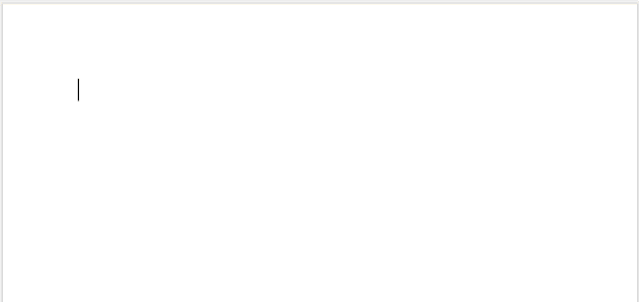The Near Future of Word Torture

Here is a line of thought that will be paralyzing for anyone who puts text into boxes for fun or profit! Imagine someone watching you type:
In November, Somers, a developer for Genius, released an app called Draftback.1 It’s a fascinating experiment that treats writing like data. After years of trying to build a program, Somers realized that Google Docs was already saving every keystroke we enter. So he hacked Google Docs to play documents back to their authors, materializing on the screen with every stutter-step inherent to the writing process. In its latest form, Draftback is a Google Chrome extension that can reach deep into the archives of any Google Doc you have editing rights to, make sense of all that writing and rewriting you innocuously poured into it, and beam it right back to you, backspaces and all. It doesn’t matter if your document was created before or after you installed Draftback — the keystrokes have been buried the whole time. Draftback can unearth any fossil.
Draftback as it exists now is about reconstruction. It gives you insight into your own “process,” if you’re comfortable referring to such a thing, but aspires to go further:
Somers wants to use Draftback to peek over somebody’s shoulder — ideally somebody really good. His personal goal is to get A.O. Scott, the Pulitzer Prize-winning film critic for The New York Times, to write a review or essay in Draftback. “He’s a beautiful prose stylist (diction, cadence, etc.), his writing is accessible and unpretentious but world-class, and he seems to always put his finger on the essence of whatever it is he’s talking about.” Somers is curious about whether all that comes naturally to Scott.
The concept eventually extends to the “ability to annotate decisions” — that is, to provide written justification or context for moments in the editing replay. This starts to sound fairly silly before you even get that far, but if you’re feeling generous you can follow along: Anyone who uses a computer or phone on a regular basis lives somewhere on the spectrum of text voyeurism, right? Messages have read receipts, posts have timestamps. People tweet as they write and write as they tweet, and it all mingles together if not seamlessly at least noticeably. Sure!
What makes this particular process feel wrong — and to some extent, what makes the (separate but related!) project of Genius feel conceptually… off? — is its application to intentional texts. Anything valuable you might learn from rewinding and watching A.O. Scott’s editing process would owe to his ignorance that someone might ever be watching. A knowingly performed writing and editing process would not be very interesting at all — the real evidence of effort and error would just move elsewhere, further out of sight. The editing product would become like the finished product, and so there would be no sense of voyeurism. Writers who intend to write in a particular form would either reject the new one or manipulate it to become more like the one they want. Requiring A.O. Scott to write about film with the knowledge that his process would be completely transparent would really be requiring him to write about writing, which is fine but undermines the whole project, right? It’s no longer peeking and stealing, it’s listening and taking notes.

The magic middle ground — the one we’re all familiar with through slightly less intentional texts — is the suggestion of voyeurism. That little iMessage animation suggests a glimpse behind the curtain — and sort of offers one, as you watch your texting partner type and then stop typing and then start again — but never lets you all the way in. It might animate then disappear forever, which could mean many different things. It might animate for a while, then pause, and animate briefly before making way for a terse “sure.” This is both performed and received as a performance, and alters the way in which people text. But it doesn’t destroy the medium or paralyze its participants. The process of creation is public but obscured. The text feels alive and urgent! Etc. An app to replay writing in not-quite real time, but instead in chunks, might be interesting.
ANYWAY, a loose prediction: This blind gap is the area from which a big part of the next internet will sprout, grow, then overgrow. Pulling down to refresh to get more and more and more is getting tiring — it feels increasingly like a passive process made unnecessarily active. The nonspecific “someone is typing” throbber, or something conceptually similar, could be the internet’s version of the chyron that never stops rolling in from the side of the screen, the 24-hour anchors that are always about to say another word. Imagine a breaking news app with a suggestive little animation at the top assuring you that something new is coming right away. Imagine Twitter with something similar! “SO AND SO IS TYPING A TWEET,” etc.
This is, I think, our next interface with the horrible endless feeds. It will be terrible! But we won’t be able to help ourselves.
